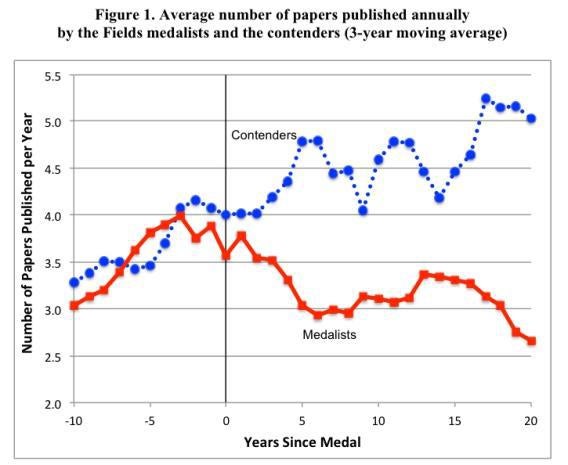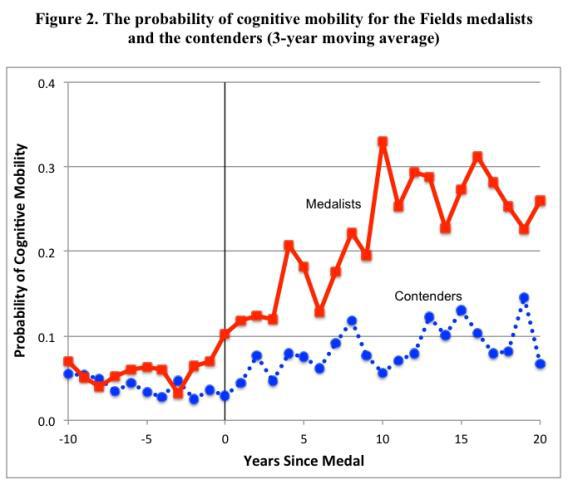This post originally appeared in Business Insider.
By Max Nisen
Prizes and rewards are designed to produce more effort, to give people something to strive towards. But what happens once they actually get it? According to a new study by Harvard’s George Borjas and Notre Dame’s Kirk Doran of recipients of the Fields Medal, the most prestigious prize in mathematics, winning big actually kills productivity.
Mathematicians who win it publish far less in the years afterwards than similarly brilliant “contenders”—highly cited mathematicians who won other prestigious awards before the age of 40 (the cutoff for the Fields), but not the prize itself. The prize is awarded every four years to two, three, or four mathematicians. It goes to show that major awards and recognition can have unintended consequences.
The drop off is pretty massive, as this chart shows:

This is explained, in part, by the classic economic “wealth effect.” The impact of the Fields medal is significant. It’s more prestigious than any other prize, and though the financial reward is a meager $15,000, the career and research opportunities available to a winner expand massively. Because they’ve achieved so much “wealth” in terms of prestige, job security, and opportunity, winners are more likely to choose leisure activities over work, just as someone who suddenly comes into significant monetary rewards might. Not only do they produce fewer papers, but the ones they do write are relatively less important. And winners take fewer mentees, as well.
The authors did find one surprising positive effect. Though they publish less, winners also take more risks in the future. They’ve already reached the pinnacle of their fields, so they feel free to pursue moonshots, new areas of mathematics that they think are fascinating or vital. The risk is quite large. The winners know they’re capable of doing extraordinary work in a particular area. Moving outside of it makes future results far less certain. Their particular gifts or talent might not translate well, and they’re going to have to learn new skills and an entirely new body of research in the new area, which is all very time consuming.
The researchers term movement outside the core field, “cognitive mobility,” and its increase explains about half of the drop off in productivity for medal winners. The prize frees them up in an extremely significant way. In the years leading up to the medal year, the likelihood of a mathematician straying from their comfort zone is very rare, at just 5 percent. For prize-winners, the rate quintuples to 25 percent.
Here’s the chart showing the increase in intellectual freedom:

George J. Borjas and Kirk B. Doran
The overall drop off is unfortunate, and many of the medalists’ experiments won’t measure up to the efforts of lifelong specialists, according to the authors. But there are benefits as well. In the late 20th century, there are three great examples of mathematicians who made great contributions in one area of mathematics, then went on to make huge contributions in a distant subject years later. All three were Fields Medal winners.
French mathematician René Thom won his medal for his earlier work in differential topology. He’s perhaps more famous for his role in developing singularity/catastrophe theory years later. David Mumford’s initial work was in algebraic geometry. He’s now a leader in developing the mathematics of vision and pattern theory. Stephen Smale’s Fields Medal came from work in many-dimensional topology. His subsequent work has had a significant impact on physics, biology, and theoretical economics.
One of the original goals of the Fields Medal was to not just give mathematicians to aspire towards, but to promote “further achievement” afterwards. It does so, if not in the most immediately apparent way. This research obviously covers a very specific and unique population. But it has implications for high performers in any area. Whether it’s promising a promotion, raise, or award, leaders have to think about the aftermath as well as the competition itself.
It’s important to reward achievement, but it may also have the unintended side effect of creating complacency. At the same time, there’s something to be said for giving top performers the opportunity and safety net required to do really innovative work, even if it’s less certain and takes longer.
Read the full paper, “Prizes and Productivity: How Winning The Fields Medal Affects Scientific Output”
See also:
The Unofficial Goldman Sachs Guide to Being a Man
Apple Reveals the iPhone 5S and iPhone 5C
The Most Common Conversation About Work Is Completely Useless